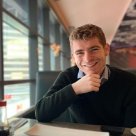Tensions in Toronto are growing over a pro-Palestinian demonstration held several times on the Avenue Road bridge over Highway 401.

On Thursday, Toronto police said the demonstrations on the bridge had “escalated” and posed a threat to public safety.
The force said demonstrations would no longer be allowed on the bridge and people would be “arrested if necessary.”
In a statement, Chief Myron Demkiw said the demonstrations, which are being held in an area with a large Jewish population, have left some in the local community feeling “intimidated.”
Some local councillors and Jewish groups have also criticized the protests.
At least three pro-Palestinian protests have been held on the bridge over Highway 401, with organizers saying the location of the event was chosen based solely on convenience and exposure.
“We are protesting because of its accessibility to us and its visibility,” a statement from Eglinton-Lawrence and Don Valley for Palestine previously said.
The group said it was following a model used to draw attention to other causes, including the war in Ukraine.
Police, however, say the events are impacting local residents and are a risk to drivers on the highway below.
- TSX flat as oil falls, U.S. stock markets mixed after Fed holds interest rates steady
- Panthers head back to work, resting and waiting for Bruins-Leafs winner
- Proline bettors still solidly behind Toronto Maple Leafs in NHL playoffs
- Ontario introduces sped-up apprenticeship path for high school students
“It is quite clear that our communities feel unsafe,” Demkiw said, responding to questions about the Avenue Road bridge demonstration ban.
“This is an overpass over the busiest highway in Canada, indeed in North America, as I understand it. It’s a piece of critical infrastructure.”
The Friends of Simon Wiesenthal Center for Holocaust Studies welcomed the ban announced by Toronto police and said there were fears among some in the local community.
“These latest actions taken by the Toronto Police Service come at a critical point, as the Jewish community deals with an extreme surge in antisemitic incidents and acts of intimidation,” the organization’s president and CEO Michael Levitt said in a statement.
On Thursday, B’nai Brith Canada, a prominent Jewish group, also said it was launching a court injunction in order to “prevent further protests on the 401 overpass.”
The group alleged the demonstrations were targeting the local Jewish community. A recent motion passed by a Toronto committee also asked city staff to clarify which government had jurisdiction over the highway bridge to inform a plan to curb demonstrations.
Tensions over the demonstration — and vehement disagreements around its impacts — come as Toronto police reported a rise in hate crimes following Hamas’ attack on Israel and the country’s subsequent daily bombardment of the Gaza Strip.
Between October and December, officers responded to an average of 190 hate crime calls every month.
“We are taking a different perspective based on the information and experiences of our communities,” Demkiw added on Thursday.
“We are going to ensure our communities feel safe in every way we can. We will not be allowing criminal intimidation of our communities.”
Speaking near the Avenue Road site on Thursday, a community member involved with the demonstrations said they were made up of a “diverse” group of locals.
“We are a diverse group of Eglinton-Lawrence constitutions — including people who are Jewish, Muslim, Christian and Hindu — with roots all over the world,” the member said.
“We wish to express our alarm and disagreement (upon) learning about the ban on protests at 401 and Avenue Road. This is an affront to civil liberties and freedom of expression.”
They said the group was exercising its right to peaceful assembly “in our own neighbourhood” by attending the rallies.
They said a total of 20 highway intersections were targeted to increase visibility for the cause for drivers on the busy highway.
The group said it was “exploring” its legal options.
Police have taken “great steps” to facilitate lawful and peaceful protests, but there are limits to freedom of speech “when things move to a criminal consideration,” Demkiw said.
The Canadian Civil Liberties Association said that while police have a duty to protect community safety and address criminal behaviour, the current situation does not seem to call for giving police unilateral power to ban any form of lawful gatherings.
Noa Mendelsohn Aviv, the association’s executive director and general counsel, said the ban “does not seem justifiable without other, extreme circumstances.”
“We all need freedom of expression to protect our rights and freedoms, and the rights and freedoms of others in this country,” she said. Free speech is “an important weapon” for minority communities, including the Jewish community, she said.
— with files from The Canadian Press



Comments